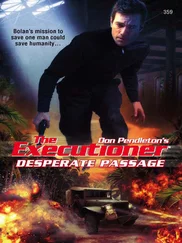Итан Рарик - Desperate Passage
Здесь есть возможность читать онлайн «Итан Рарик - Desperate Passage» весь текст электронной книги совершенно бесплатно (целиком полную версию без сокращений). В некоторых случаях можно слушать аудио, скачать через торрент в формате fb2 и присутствует краткое содержание. Жанр: Путешествия и география, на английском языке. Описание произведения, (предисловие) а так же отзывы посетителей доступны на портале библиотеки ЛибКат.
- Название:Desperate Passage
- Автор:
- Жанр:
- Год:неизвестен
- ISBN:нет данных
- Рейтинг книги:4 / 5. Голосов: 1
-
Избранное:Добавить в избранное
- Отзывы:
-
Ваша оценка:
- 80
- 1
- 2
- 3
- 4
- 5
Desperate Passage: краткое содержание, описание и аннотация
Предлагаем к чтению аннотацию, описание, краткое содержание или предисловие (зависит от того, что написал сам автор книги «Desperate Passage»). Если вы не нашли необходимую информацию о книге — напишите в комментариях, мы постараемся отыскать её.
Desperate Passage — читать онлайн бесплатно полную книгу (весь текст) целиком
Ниже представлен текст книги, разбитый по страницам. Система сохранения места последней прочитанной страницы, позволяет с удобством читать онлайн бесплатно книгу «Desperate Passage», без необходимости каждый раз заново искать на чём Вы остановились. Поставьте закладку, и сможете в любой момент перейти на страницу, на которой закончили чтение.
Интервал:
Закладка:
In time, the lake bequeathed two legacies, both essentially lifeless. As the last Ice Age ended and temperatures rose, evaporation rates increased until the atmosphere began sucking away more water from the lake than the rivers could pour in. Unable to sustain itself, the lake began to die of thirst, the waters receding until evaporation and input came into rough annual equilibrium, creating the body of water we know today as the Great Salt Lake, the runt child of Lake Bonneville. Like its parent, the Great Salt Lake has no outlet, and thus the minerals carried in by feeder rivers cannot be swept away by drainage streams. The result, of course, is increasing salinity; today the lake is brinier than the ocean, and home to virtually no marine life.
To the west, Bonneville's receding waters deposited billions of tons of salt, spread across the playa as though troweled on by a giant mason. Seepage from the lake itself soaks the underlying surface, creating vast bogs of soft alkaline loam. The liquid rarely breaks through, and even if it did it would not be drinkable, so the salt flats present a strange paradox: a moist and muddy desert devoid of potable water. Almost nothing grows there, and almost no animals can be seen. The only break in the relentless, blinding whiteness of the salt is a few tiny mountain chains, the tops of which were once islands poking up through the frothy waters of Lake Bonneville. Yet the Great Salt Lake Desert lay directly in the wagons' path as they came down from the Wasatch. The Hastings Cut-Off, in other words, led straight through one of the most inhospitable places on earth.
European or American parties had rarely penetrated the heart of the desert. A train of emigrants had crossed the northern section in 1841, nearly dying in the process. The southern portion—the route now proposed by Hastings—had been traversed only twice, and both times without wagons. The explorer John C. Fremont had led a paramilitary party through in 1845, and Hastings himself had crossed from west to east earlier in 1846, the trip that convinced Jim Clyman that Hastings's plan was madness. With superior local knowledge, Indians may have crossed the desert from time to time, though we have no written record of such ventures. Or they may have known enough to give the region a wide berth; emigrant records make no mention of Indian trails, as they often do in other portions of the West.
Marching along toward this great plain, the Donner Party found the trail of the Harlan-Young Party, the group up ahead that Hastings was leading, and fell in behind. If Hastings refused to return and guide their wagons as he had promised, at least they could follow his tracks.
LUKE HALLORAN HOPED THE WEST would cure him, not kill him. A young, entrepreneurial Irishman who owned a small store in St. Louis, Halloran was a success—he owned six lots in town—but decided to give up his comforts to search for better health. He hoped that the western climate might cure his tuberculosis, what emigrants called "consumption." Little is known about the early part of his journey, but at the Parting of the Ways he was abandoned by the family with which he was traveling. Alone and in poor health, he sought refuge with George and Tamzene Donner, who displayed a characteristic kindness and took him in. Too weak to walk, Halloran rode in a wagon, though even such luxury could not stop the ravages of his disease. He traveled with the Donners for more than a month, but died just after they came down out of the Wasatch and was buried in the salty soil of Utah. Having rescued him from abandonment once, perhaps the Donners did not want to leave Halloran alone in the wilderness again. They dug his grave next to that of an earlier emigrant who had also succumbed to the rigors of the great journey west.
TAMZENE DONNER, THE WOMAN WHO had doubted the wisdom of the Hastings Cut-Off from the beginning, gathered the fragments of paper scattered before her on the Utah desert. The note, apparently written by Hastings, had been torn apart by birds or animals or simply the elements. Donner assembled them like a jigsaw puzzle and produced a reconstructed missive that was both cryptic and fearsome: "2 days—2 nights—hard driving—cross—desert—reach water."
At Fort Bridger, the emigrants had heard warnings about the salt desert, rumors that it required a "dry drive" of forty miles without grass or water. Arid stretches of trail posed a particular hardship for the pioneers, since their overburdened wagons could carry little added weight, and water is an extraordinarily heavy commodity. A fifty-five-gallon barrel, for example, weighs close to five hundred pounds when filled. Even a fifteen-gallon barrel—a container only about two feet high—weighs well over a hundred pounds, the equivalent of asking the oxen to drag another full-grown woman across the desert. Hastings's note, found at a spring, presumably signaled the last oasis before the wastelands. The wagons stayed in camp the next day, "wooding watering and laying in a Supply of grass for our oxen and horses," as Reed put it in his diary. They expected to spend one night out on the desert, he noted, but doubted they would find "grass wood or water of sufficentt quallity or quantity to be procured."
The desolation they were about to enter has challenged even modern expeditions armed with the benefits of technology. In 1929, when a small group set out to track the route in a Model A, the vehicle became mired in "soapy slime" and could be freed only when the men dismantled the bed of an abandoned pioneer wagon and forced the boards under the car's wheels for added traction. Fearing a similar fate, a later expedition resorted to a converted Caterpillar tractor. As recently as 1986, archaeologists working in early September, exactly the season of the Donner Party's crossing, found it impossible to cross the "semisolid mud flats" in modern, four-wheel-drive trucks and were forced to use all-terrain vehicles instead.
For nineteenth-century emigrants like the Donner Party, the bogs clung tenaciously to hooves and wagon wheels. Mules sank to their knees, sometimes to their bellies, floundering forward and kicking up vast clouds of suffocating dust as thick as fog. Riders often had to dismount, lessening the burden on the horses but slowing the pace. Heat waves baked the days; frigid winds chilled the nights. With wood scarce, some parties swore off a cooked breakfast, starting the day's march on cold tack or even an empty stomach. Water was more valuable still, so only tiny rations were allowed. Often, thirst gave way to hallucination, and families imagined themselves marching toward cooling lakes or lush, verdant meadows or even magnificent cities dotted with grand homes and shaded, regal avenues. If there was any other living thing for miles, the emigrants could not see it. "The hiatus in the animal and vegetable kingdoms was perfect," wrote Edwin Bryant, the journalist who had once traveled with the Donners. The desert, he said, was "unearthly."
By midday on Wednesday, September 2, the members of the Donner Party had been marching through this lifeless vacuum for more than two days with little sleep or rest. It had been three days since they passed the last spring with drinkable water, and the oxen began to give out. The line of march elongated—families pulling ahead if they could and lagging behind if they could not—but even the forward-most group could not make it with all their wagons. So teamsters unhitched their animals and drove them onward, hoping merely to keep the beasts alive and return later for the abandoned cargo. Teamsters kept their eyes on Pilot Peak, an aptly named and plainly visible mountain at the desert's western edge with a well-known freshwater spring at its base.
The Reeds struggled near the rear of the line. James Reed decided to ride ahead to fetch water and then return, telling his hired teamsters before he left that if necessary they should unyoke the oxen and drive them forward, along with the cattle he was taking west as livestock. Reed reached the encampment beneath Pilot Peak about dark, just a few hours after the other families had made it. He stayed for an hour, drinking from the spring and resting, and then started back toward his family. Sometime before midnight, he encountered his own teamsters, driving his oxen and cattle toward the spring, and told them to water the animals and then follow him back out onto the desert.
Читать дальшеИнтервал:
Закладка:
Похожие книги на «Desperate Passage»
Представляем Вашему вниманию похожие книги на «Desperate Passage» списком для выбора. Мы отобрали схожую по названию и смыслу литературу в надежде предоставить читателям больше вариантов отыскать новые, интересные, ещё непрочитанные произведения.
Обсуждение, отзывы о книге «Desperate Passage» и просто собственные мнения читателей. Оставьте ваши комментарии, напишите, что Вы думаете о произведении, его смысле или главных героях. Укажите что конкретно понравилось, а что нет, и почему Вы так считаете.












